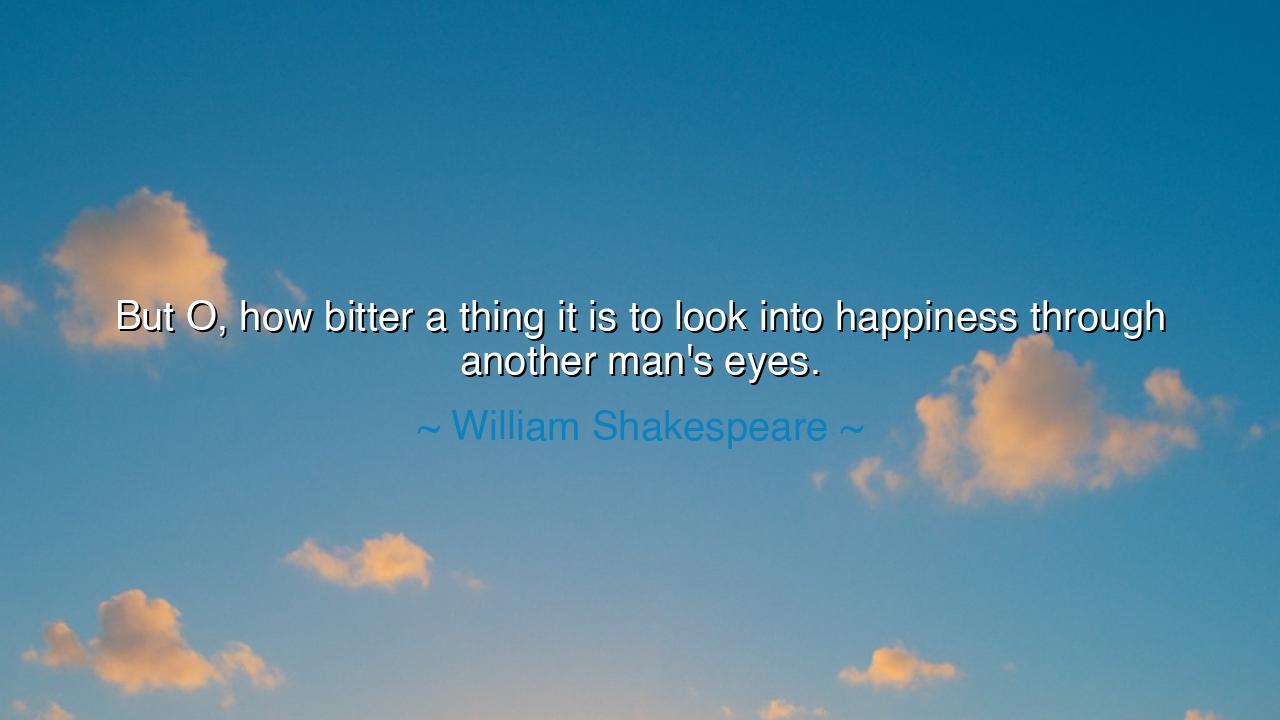
But O, how bitter a thing it is to look into happiness through






The great bard William Shakespeare, in his timeless wisdom, once wrote: “But O, how bitter a thing it is to look into happiness through another man’s eyes.” These words, though spoken centuries ago, still pierce the soul with the sting of eternal truth. For what agony equals the sorrow of beholding joy that is not our own? To see the world’s light shine upon another while our own hearts remain in shadow—this is a grief both silent and consuming, one that tests the very fabric of the human spirit.
This line is drawn from As You Like It, one of Shakespeare’s pastoral comedies, yet within its laughter lies a vein of profound melancholy. The speaker, Jaques, is a man who observes life but does not live it. He stands apart, watching others love, laugh, and rejoice, while he remains untouched by their delight. His lament reveals the bitterness of envy, not the petty envy of possessions or titles, but the deeper sorrow of the soul that yearns for a happiness it can witness but cannot taste. Through Jaques, Shakespeare holds a mirror before us, showing that to live only as a spectator in the theatre of joy is to deny oneself the fullness of being human.
Throughout the ages, many have known this bitterness. Consider the story of Vincent van Gogh, the painter whose genius saw colors that the world could not yet understand. He gazed upon the laughter of his brother’s family, the companionship of others, the prosperity of men whose work received applause—and though he loved them, his own heart remained a desert of solitude. He once wrote, “I feel that there is nothing more truly artistic than to love people,” and yet his life was starved of that love. His eyes could perceive beauty more vividly than any other, but that beauty lived only on his canvases, not in his days. Thus he, too, looked into happiness through another man’s eyes, and it broke him.
But this pain, though cruel, is not without purpose. For it is often through longing that the soul is awakened. The bitter taste of another’s joy reminds us of what we lack, yes—but also of what we still desire to create. Envy can be transmuted into inspiration, if only one dares to act. The one who gazes upon happiness from afar stands at a crossroads: to be devoured by resentment, or to rise and seek their own share of light. It is the same fire that can burn or illuminate, depending on the courage of the one who bears it.
And yet, there is a gentler lesson hidden within Shakespeare’s lament. It teaches that comparison is the thief of peace. To measure one’s worth against another’s joy is to lose sight of one’s own blessings. Happiness, like the dawn, comes to each soul in its own hour. The eyes that now see only another’s brightness may soon behold their own sunrise. Thus, wisdom urges patience—to tend the soil of one’s life, rather than covet the blossoms of another’s garden.
The ancients would have said: do not curse the mirror for reflecting what you lack; instead, use it to recognize what you must become. The bitterness that arises when we witness another’s joy is a signal, not a sentence. It tells us that our heart still hopes. That we are still capable of desire, still called to build, to love, to live. To see happiness through another’s eyes is to remember that joy exists—and that we, too, are meant for it.
Therefore, my child, when you find yourself gazing upon the laughter of others, do not turn away in despair. Let their joy be a promise, not a punishment. Work with your hands, dream with your heart, and walk the path that leads you toward your own dawn. For in time, your eyes too shall shine with the light of happiness—and another, watching you, may whisper as Jaques did, “O, how bitter a thing it is to look into happiness through another man’s eyes.” Let that be your call to compassion, not pride; to creation, not envy. For the world grows brighter when one more soul turns its gaze inward and kindles its own light.






AAdministratorAdministrator
Welcome, honored guests. Please leave a comment, we will respond soon